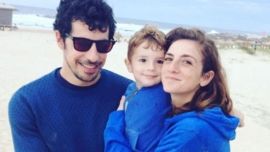President Alberto Fernández has announced that Argentina and Mexico will co-produce millions of doses of a coronavirus vaccine developed by the AstraZeneca pharmaceutical firm and scientists at the University of Oxford, with it potentially reaching citizens across Latin America in the first quarter of next year.
The Peronist leader, speaking at a press conference at the Olivos presidential residence on Wednesday, said that the two countries would be in charge of the “Latin American production” and distribution of a vaccine created by the prestigious British university and Swedish-British pharmaceutical group.
Argentina will be in charge of producing "the active substance," said Fernández, with Mexico finishing "production and packaging."
He said that the country "could be in a position to vaccinate" by the first quarter of 2021.
An agreement signed between AstraZeneca and the mAbxience biotechnology company of Argentina’s Grupo Insud includes transfer of technology to initially produce 150 million doses, officials said. Fernández said AstraZeneca’s choice of mAbxience was “a recognition of quality” of Argentine laboratories.
"AstraZeneca has signed an agreement with the [Mexican NGO, the Carlos] Slim Foundation” for the financing to produce “between 150 and 250 million vaccines destined for all of Latin America, with the exception of Brazil," said Fernández, who said the doses would be “distributed equitably among the countries that demand it.”
"It's beautiful news, a hopeful piece of information and a source of great pride that we can work together with Mexico to provide an answer for our beloved continent," he added, while cautioning that the vaccine was still in phase three trials and not yet fully proven to be effective.
The vaccine developed by scientists at the University of Oxford and the AstraZeneca laboratory is one of the most advanced scientific efforts to combat the coronavirus so far. According to respected medical journal The Lancet, it "proved to be safe for the immune system and to have produced antibodies against Covid-19."
Fernández said the deal “gives Argentina the peace of mind of being able to have the vaccine when required and at a reasonable price. He stressed that it was a “non-profit” project and praised those involved.
"It is a non-profit project, we must celebrate the decision of the company and the University of Oxford, which are guaranteeing a vaccine without profit and without the economic benefits for that vaccine. We celebrate that," he said, adding that the vaccine would cost between US$3 to US$4 a dose, an “accessible” price for Argentina.
He said the agreement would allow Argentine scientists “access” to the vaccine “six or 12 months” earlier than without a deal.
The president warned, however, that nothing would change in the immediate future and asked citizens to continue taking care and to maintain “social responsibility.”
Britain’s Ambassador to Argentina Mark Kent welcomed the news. "We are very pleased with this announcement by the Argentine government. It is an example of the kind of cooperation that is required at this time," he said in a post on Twitter, tagging the Swedish-British firm and University of Oxford.
‘Very good news’
Rumours of the news first broke at around Wednesday midday, after Health Minister Ginés González García told reporters at an event that the president would be announcing “very good news” about the development of a vaccine later in the day.
Later, at the press conference, the minister described the vaccine in development has having “the upper hand,” though he stressed that it wasn’t “the only negotiation nor the only alternative.” He said that “the elderly, health workers” and those at risk from the virus would receive it first.
During an interview earlier in the week, the health minister had speculated that a vaccine could be ready for deployment in Argentina “in the first quarter of next year.”
The vaccine is a result of joint effort by scientists at the University of Oxford and AstraZeneca, a Swedish-British pharmaceutical group. Officials from the company met with the president and officials back in July.
Around 150 million doses will initially be produced by Argentina and Mexico in total, which will then be distributed throughout the region with the exception of Brazil, which has a separate agreement.
Three days ago, the Brazilian government announced that it would start mass production of the Oxford-AstraZeneca vaccine in December, confirming that it had reserved 100 million doses and contributed US$360 million to its development in the process. Brazil is adopting multiple efforts – it has also partnered with China's Sinovac to produce 120 millions of "CoronaVac," which is already undergoing testing with Brazilians.
As research laboratories around the world race to develop a vaccine, many manufacturers have received financing to help them prepare to have millions of doses ready to administer in 2021 or even before the end of the year.
Trials
According to the results of its first trials, published in The Lancet, the Oxford-AstraZeneca vaccine is safe for the immune system and does produce antibodies. It also had a favourable reaction in ‘T cells’ within 14 days of vaccination, meaning white blood cells can attack cells infected with the SARS-CoV-2 virus.
Researchers said no unexpected side effects were reported. It is currently in phase three development, after clearing stages one and two, which featured 1,077 volunteers.
The race for a vaccine is well under way across the globe. Although none of the coronavirus vaccines under development have proved their efficacy yet in clinical trials, at least 5.7 billion doses have been pre-ordered around the world. Five vaccines – three Western and two Chinese – are in Phase 3 efficacy trials involving thousands of people.
In a surprise announcement, Russian President Vladimir Putin claimed Tuesday that a vaccine dubbed "Sputnik V" – after the Soviet satellite – conferred "sustainable immunity" against the novel coronavirus. Some experts have expressed doubt over those claims.
President Fernández wrote to Putin this week, saying news of the vaccine’s development had brought him “great hope.” He described the news as “an achievement that will remain among the indelible pages of the history of global medicine."
– TIMES/NA/PERFIL/AFP


























Comments